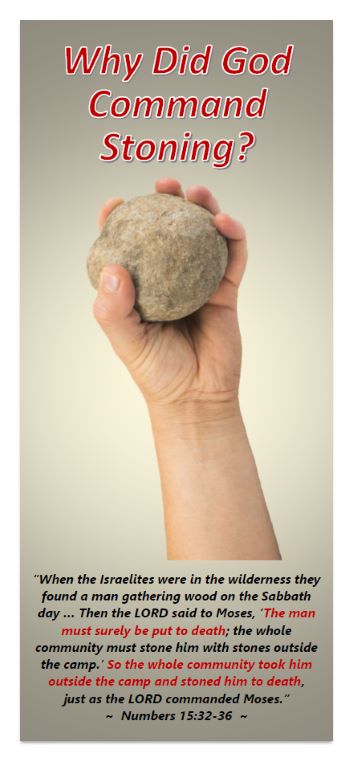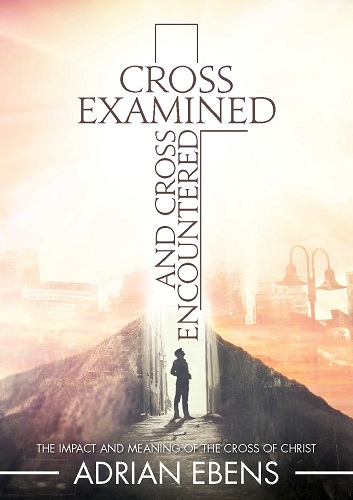(Numbers 21:5-6) Didn’t God Send Fiery Serpents To Kill the People When They Complained At His Leadership?
“And they journeyed from mount Hor by the way of the Red sea, to compass the land of Edom: and the soul of the people was much discouraged because of the way. And the people spake against God, and against Moses, Wherefore have Ye brought us up out of Egypt to die in the wilderness? for there is no bread, neither is there any water; and our soul loatheth this light bread. And the LORD sent fiery serpents among the people, and they bit the people; and much people of Israel died.” (Numbers 21:5, 6)
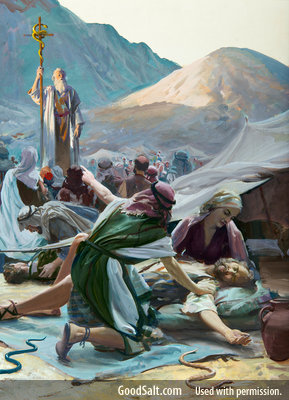 When we look at the word “sent” here we see that it is the Hebrew word שָׁלַח (shalach), which Strong’s Concordance gives many definitions such as:
When we look at the word “sent” here we see that it is the Hebrew word שָׁלַח (shalach), which Strong’s Concordance gives many definitions such as:
- Let go
- Gave over
- Go free
- Let out freely
- Let loose
- Released
- Sent
When we provide the word “let go” or “let loose” the sentence would read: “And the LORD let loose fiery serpents among the people, and they bit the people; and much people of Israel died.” This would imply that the serpents were already in the land and God and His angels had been holding these serpents back away from the people protecting them along their journey. When the people began to complain about the food God was feeding them, they were disbelieving in God's protective care. This grieved God’s Spirit and as a result He permitted the people to step out from under His protection at their own request. Notice what Moses says to the people in the book of Deuteronomy:
“Then thine heart be lifted up, and thou forget the LORD thy God, which brought thee forth out of the land of Egypt, from the house of bondage; Who led thee through that great and terrible wilderness, wherein were fiery serpents, and scorpions, and drought, where there was no water; who brought thee forth water out of the rock of flint; Who fed thee in the wilderness with manna, which thy fathers knew not, that He might humble thee, and that He might prove thee, to do thee good at thy latter end.” (Deuteronomy 8:14-16)
Notice here God had been protecting them from the serpents which were already in the land. God didn't go out and have to round up a bunch of serpents. By their own choice they made a breach in God’s protective hedge/Law. By stepping out from underneath His protective hand it opened the way for the serpents to bite because “He that diggeth a pit shall fall into it; and whoso breaketh an hedge, a serpent shall bite him.” (Ecclesiastes 10:8).
Notice how Psalm 78 uses the word “sending” when speaking of the plagues of Egypt:
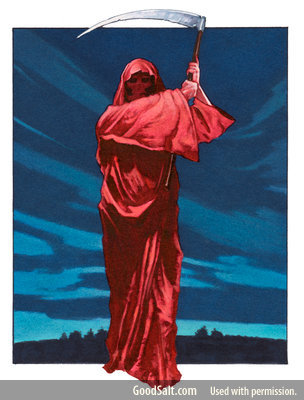 “How He (God) had wrought His signs in Egypt, and His wonders in the field of Zoan: And had turned their rivers into blood; and their floods, that they could not drink … He cast upon them the fierceness of His anger, wrath, and indignation, and trouble, by sending evil angels among them.” (Psalm 78:44, 45, 49)
“How He (God) had wrought His signs in Egypt, and His wonders in the field of Zoan: And had turned their rivers into blood; and their floods, that they could not drink … He cast upon them the fierceness of His anger, wrath, and indignation, and trouble, by sending evil angels among them.” (Psalm 78:44, 45, 49)
Do God and evil angels work together for a common good? Never (2 Corinthians 6:14-17). The Hebrew word for “sending” used here is מִשְׁלַחַת (mishlachath) which means “a discharge, deputation, sending.” Here again we see that God “discharged” or even “let loose” these evil angels. This is God’s wrath. God’s wrath is Him tearfully letting the unbeliever reap what they sow, which always results in destruction. Notice how Psalm 78 describes God’s wrath during the time of the wilderness wandering:
“Therefore the LORD heard this, and was wroth: so a fire was kindled against Jacob, and anger also came up against Israel; Because they believed not in God, and trusted not in his salvation: Though He had commanded the clouds from above, and opened the doors of heaven, And had rained down manna upon them to eat, and had given them of the corn of heaven. Man did eat angels' food: He sent them meat to the full. He caused an east wind to blow in the heaven: and by His power He brought in the south wind. He rained flesh also upon them as dust, and feathered fowls like as the sand of the sea: And He let it fall in the midst of their camp, round about their habitations. So they did eat, and were well filled: for He gave them their own desire.” (Psalm 78:21-29)
So we see here that God’s wrath against the murmuring Israelites was expressed by giving “them their own desire.”
Doesn't it Say God "caused" it to Happen?
The writer here also uses the following expressions:
“He caused an east wind to blow in the heaven: and by His power He brought in the south wind. He rained flesh also upon them as dust.”
How did this happen? Simply by God permitting the people to nail down His protective hand, leaving them without His protective presence. Let's look at the verse again along with this added concept:
“[By the absence of His protective presence] He caused an east wind to blow in the heaven: and by His power He brought in the south wind. He rained flesh also upon them as dust.”
But let’s look at the phrase “by His power” a little closer. In the book of Job we read that upon one of the appointed times in heaven Satan walks in and confronts God:
“Now there was a day when the sons of God came to present themselves before the LORD, and Satan came also among them. And the LORD said unto Satan, Whence comest thou? Then Satan answered the LORD, and said, From going to and fro in the earth, and from walking up and down in it. And the LORD said unto Satan, Hast thou considered my servant Job, that there is none like him in the earth, a perfect and an upright man, one that feareth God, and escheweth evil? Then Satan answered the LORD, and said, Doth Job fear God for nought? Hast not Thou made an hedge about him, and about his house, and about all that he hath on every side? Thou hast blessed the work of his hands, and his substance is increased in the land. But put forth Thine hand now, and touch all that he hath, and he will curse Thee to thy face. And the LORD said unto Satan, Behold, all that he hath is in thy power; only upon himself put not forth thine hand. So Satan went forth from the presence of the LORD.” (Job 1:6-12)
None of us, including Satan, lives and breathes on our own without God’s power sustaining us; “For in Him we live, and move, and have our being.” (Acts 17:28). Whenever any one of us sins, we are perverting God’s sustaining power. Read the following thoughts from Christian author A.T. Jones (1850-1923):
“We know from the Word of inspiration that power “belongeth unto God;” that indeed, “there is no power but of God.” Ps. 62:11; Rom. 13:1. God upholds all things by “the word of his power.” Heb. 1:3. “He giveth to all life, and breath, and all things,” and “in him we live, and move, and have our being.” Earthly power is the power of God, perverted by sin. The Creator so respects man’s free will, that he gives him power to do that which is contrary to the divine will. This power however is limited; but God gives man unlimited power to do that which is according to his will. The unlimited power of God is manifested through the Holy Spirit. And therefore it is written of the work of God, “not by might, nor by power, but by my Spirit, saith the Lord.” (A.T Jones, American Sentinel, August 25, 1898)
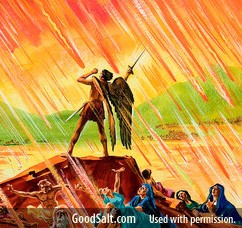 This is how even destructive things can be attributed to the working of God’s power even if God is not the one who is directly causing the destruction. We find this as we keep reading in the book of Job:
This is how even destructive things can be attributed to the working of God’s power even if God is not the one who is directly causing the destruction. We find this as we keep reading in the book of Job:
“While he (Job) was yet speaking, there came also another, and said, The fire of God is fallen from heaven, and hath burned up the sheep, and the servants, and consumed them; and I only am escaped alone to tell thee.” (Job 1:16)
Notice how the messenger says the destructive fire came from God, but we know from what we read earlier that it was really Satan that caused this fire. Satan was perverting the power of God. Through God’s free will, He gave Satan power (life), but he chose to use that power to do that which is contrary to the divine will and then deceives us into thinking God is the one who is causing the destructive acts.
This concept appears again in Exodus 12:
“For I will pass through the land of Egypt this night, and will smite all the firstborn in the land of Egypt, both man and beast; and against all the gods of Egypt I will execute judgment: I am the LORD.” (Exodus 12:12)
Here we see that it is God who will smite the Egyptians. But let’s look at verse 23:
“For the LORD will pass through to smite the Egyptians; and when He seeth the blood upon the lintel, and on the two side posts, the LORD will pass over the door, and will not suffer the destroyer to come in unto your houses to smite you.”
Clearly it was not God who directly killed the firstborn sons of Egypt. It was “the destroyer.” Using God’s sustaining power is the only way the destroyer (Satan) can “live, and move, and have [his] being.” Sadly, Satan always chooses to pervert God’s sustaining power for evil.
Who Really Destroyed Them?
With this in mind, let’s read what Peter wrote concerning the Israelites and the fiery serpents:
“Neither let us tempt Christ, as some of them also tempted, and were destroyed of serpents. Neither murmur ye, as some of them also murmured, and were destroyed of the destroyer.” (1 Corinthians 10:9, 10)
Here it is translated that “the destroyer” destroyed the Israelites who were murmuring. However, the word for “destroyer” here is ὀλοθρευτής (olothreutés) which literally means “venomous serpent.” This “venomous serpent” is “the destroyer.” Who is this serpent?
 “And the great dragon was cast out, that old serpent, called the Devil, and Satan, which deceiveth the whole world: he was cast out into the earth, and his angels were cast out with him.” (Revelation 12:9)
“And the great dragon was cast out, that old serpent, called the Devil, and Satan, which deceiveth the whole world: he was cast out into the earth, and his angels were cast out with him.” (Revelation 12:9)
Clearly Satan is the destroyer who killed all the firstborn sons of Egypt and round up all the fiery serpents in the wilderness.1
We can even go a step further for more proof. The Hebrew word for “fiery” in the phrase “fiery serpents” in Numbers 21 is שָׂרָף (seraph) which itself literally means “fiery serpent.” The prophet Isaiah also uses this word in chapter 6:
“In the year that king Uzziah died I saw also the Lord sitting upon a throne, high and lifted up, and His train filled the temple. Above it stood the seraphim: each one had six wings; with twain he covered his face, and with twain he covered his feet, and with twain he did fly.” (Isaiah 6:1, 2)
The Hebrew word for “seraphim” here is שָׂרָף (seraph). These six-winged angels (seraphim) are “fiery serpents.” Notice that it is above the throne of God that these seraphim are stationed. This is the high and lofty place that Satan used to occupy which was represented by the two golden cherubim (angels) that covered the Ark of the Covenant:
"And thou shalt make a mercy seat of pure gold: two cubits and a half shall be the length thereof, and a cubit and a half the breadth thereof. And thou shalt make two cherubim of gold, of beaten work shalt thou make them, in the two ends of the mercy seat. And make one cherub on the one end, and the other cherub on the other end: even of the mercy seat shall ye make the cherubim on the two ends thereof. And the cherubim shall stretch forth their wings on high, covering the mercy seat with their wings, and their faces shall look one to another; toward the mercy seat shall the faces of the cherubim be. And thou shalt put the mercy seat above upon the Ark; and in the Ark thou shalt put the testimony (10 Commandments) that I shall give thee. And there I will meet with thee, and I will commune with thee from above the mercy seat, from between the two cherubim which are upon the ark of the testimony, of all things which I will give thee in commandment unto the children of Israel." (Exodus 25:17-22)
 “Son of man, take up a lamentation upon the king of Tyrus2, and say unto him, Thus saith the Lord GOD; Thou sealest up the sum, full of wisdom, and perfect in beauty. Thou hast been in Eden the garden of God; every precious stone was thy covering, the sardius, topaz, and the diamond, the beryl, the onyx, and the jasper, the sapphire, the emerald, and the carbuncle, and gold: the workmanship of thy tabrets and of thy pipes was prepared in thee in the day that thou wast created. Thou art the anointed cherub that covereth; and I have set thee so: thou wast upon the holy mountain of God; thou hast walked up and down in the midst of the stones of fire. Thou wast perfect in thy ways from the day that thou wast created, till iniquity was found in thee.” (Ezekiel 28:12-15)
“Son of man, take up a lamentation upon the king of Tyrus2, and say unto him, Thus saith the Lord GOD; Thou sealest up the sum, full of wisdom, and perfect in beauty. Thou hast been in Eden the garden of God; every precious stone was thy covering, the sardius, topaz, and the diamond, the beryl, the onyx, and the jasper, the sapphire, the emerald, and the carbuncle, and gold: the workmanship of thy tabrets and of thy pipes was prepared in thee in the day that thou wast created. Thou art the anointed cherub that covereth; and I have set thee so: thou wast upon the holy mountain of God; thou hast walked up and down in the midst of the stones of fire. Thou wast perfect in thy ways from the day that thou wast created, till iniquity was found in thee.” (Ezekiel 28:12-15)
This is why God told the serpent in the garden that it would henceforth be "cursed above all cattle, and above every beast of the field; upon thy belly thou shalt go, and dust shalt thou eat all the days of thy life" (Genesis 3:14). The serpent in the garden was stripped of its wings, symbolizing that Satan had forfeited his high and lofty position in heaven as being one of the covering angels. Through Satan's influence, he led the heathen practice of worshipping winged serpents.
"The uniqueness of these 'standing seraphim' in the OT and their obviously perplexing character have apparently led few scholars to concern themselves with their identification and significance. However, there is sufficient linguistic and archaeological evidence to suggest that the seraphim are to be identified as winged serpents and are Egyptian symbols of sacral and regal sovereignty." (Karen Randolph Joines, Winged Serpents in Isaiah's Inaugural Vision)
Why is Christ Likened to the Serpent?
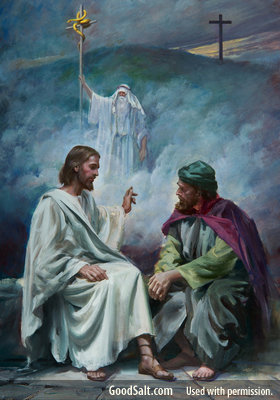 In the book of John we read that Nicodemus, a Jewish religious leader, came to Jesus secretly one night and Jesus told him ...
In the book of John we read that Nicodemus, a Jewish religious leader, came to Jesus secretly one night and Jesus told him ...
"And as Moses lifted up the serpent in the wilderness, even so must the Son of man (the Messiah/Christ] be lifted up: That whosoever believeth in Him should not perish, but have eternal life." (John 3:14, 15)
If the serpent is a symbol of Satan, why would Jesus compare Himself to the serpent which was hung up on the pole? Jesus is likened to the serpent on a pole because, by being lifted up on the cross, He would be exposing Satan as a "murderer from the beginning" (John 8:44). Satan's unmerciful justice system would be laid wide open. Just before Judas betrayed Jesus, Scripture says, "Satan entered Judas" (Luke 22:3). Judas then leaves the Passover meal and finds the Jewish leaders. A little later Judas, along with the Jewish leaders and Roman soldiers, come to the Garden of Gethsemane to take Jesus away. When they arrive, Jesus says this to the mob: "this is your hour, and the power of darkness" (Luke 22:53).
Throughout His whole life on earth God had protected His Son from being killed by man. However, from the agonizing night in Gethsemane to the resurrection morning, God offered His Son, giving Him over to the hands of Satan and man, or as Jesus put it, "three days and three nights in the heart (sinful affections) of the earth" (Matthew 12:40-42; Genesis 6:5; Psalm 58:2). God did not kill His Son upon the cross, He permitted Satan and man to kill His Son. Jesus dying upon the cross exposed the character of Satan, "that serpent of old," in order for us to finally see how Satanic we really are. It wasn’t God’s justice that was satisfied on the cross, it was our faulty system of appeasement-justice that was satisfied in the hopes that we would turn to God in true repentance (2 Corinthians 5:21) and finally accept His forgiveness. Thus by condemning and killing the Son of God, Satan condemned and judged himself.
"Judge not, that ye be not judged. For with what judgment ye judge, ye shall be judged: and with what measure ye mete, it shall be measured to you again." (Matthew 7:1, 2)
His character and worldly government was exposed when Jesus was lifted up upon the cross:
"Now is the judgment (self-condemnation/self-exposure) of this world: now shall the prince of this world (Satan) be cast out. And I (Jesus), if I be lifted up from the earth, will draw all men unto Me." (John 12:31, 32)
Any remaining rapport (or sympathy) was forever cut off between the unfallen realm and Satan when Christ ascended back to His Father:
"And she brought forth a Man Child, who was to rule all nations with a rod of iron: and her Child was caught up unto God, and to His throne ... And there was war in heaven: Michael and His angels fought against the dragon; and the dragon fought and his angels, And prevailed not; neither was their place found any more in heaven. And the great dragon was cast out, that old serpent, called the Devil, and Satan, which deceiveth the whole world: he was cast out into the earth, and his angels were cast out with him. And I heard a loud voice saying in heaven, Now is come salvation, and strength, and the kingdom of our God, and the power of His Christ: for the accuser of our brethren is cast down (exposed), which accused them before our God day and night. And they overcame him by the blood of the Lamb, and by the word of their testimony; and they loved not their lives unto the death. Therefore rejoice, ye heavens, and ye that dwell in them. Woe to the inhabiters of the earth and of the sea! for the devil is come down unto you, having great wrath, because he knoweth that he hath but a short time." (Revelation 12:5, 7-12)
1 For a more detailed look at the destroyer during the time of the plagues see the question entitled: Who Really Killed the Firstborn in Egypt?
2 It is widely accepted that, although Isaiah 14 and Ezekiel 28 are referring to the earthly kings of Babylon and Trye, they are prophetically speaking of Satan and his rebellion against God.




